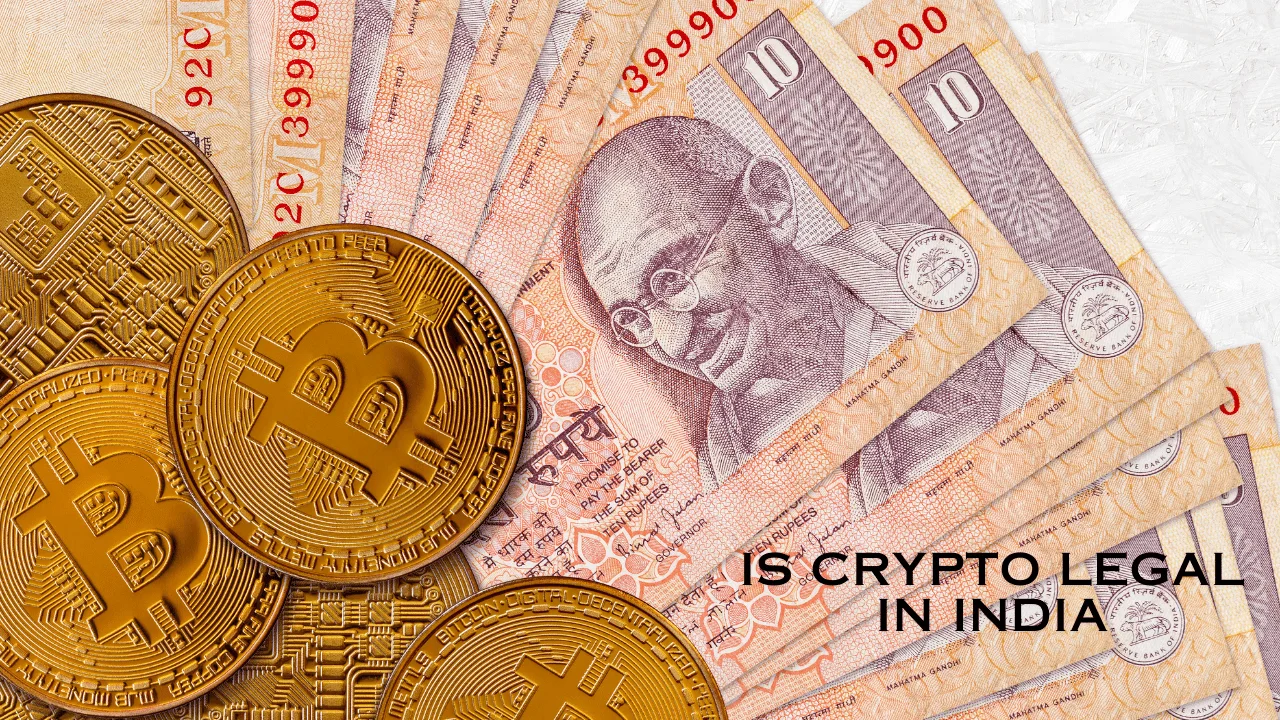Amidst the global debate on cryptocurrencies and their legal status, one pressing question looms over India’s burgeoning digital landscape: Is Crypto Legal in India? As cryptocurrencies gain traction and influence, India’s stance on their legality becomes increasingly crucial. With the nation’s digital economy expanding rapidly, there’s a growing curiosity among consumers and businesses regarding the legal framework surrounding cryptocurrencies. This article aims to shed light on the complex realm of cryptocurrency regulation in India, delving into its legal standing, regulatory approaches, and potential future implications.
Cryptocurrency Regulation in India

Cryptocurrency in India
The tech-savvy, investors, and individuals seeking alternatives to conventional banking institutions in India have sent cryptocurrency into a frenzy, causing a flurry of activity. There is still a lot of mystery and conjecture around the regulatory system in India that controls cryptocurrency, even if it’s becoming more popular. The government’s cautious approach, changing legislative plans, and lack of a centralised crypto space regulator all contribute to this air of uncertainty.
Legal Status and Regulatory Framework
A precarious equilibrium between regulatory prudence and the recognition of digital innovation characterises the legal situation of cryptocurrencies in India. The Indian government has not formally acknowledged cryptocurrency as legal tender as of the year 2024. This means that citizens cannot buy or sell goods and services using these digital assets. Nevertheless, the lack of official acknowledgment does not constitute a complete prohibition, leading to a convoluted legislative landscape in which cryptocurrency investments and transactions persist in an atmosphere of unpredictability.
RBI’s Stance on Cryptocurrencies
Concerns about financial stability, money laundering, and investment protection have led the Reserve Bank of India (RBI) to take a sceptical stance towards cryptocurrencies. In 2020, the Reserve Bank of India (RBI) made a daring effort to limit banks’ ability to provide services to cryptocurrency businesses, so limiting the growth of India’s cryptocurrency ecosystem. The Supreme Court of India, however, reversed this ruling, which was a watershed moment in the history of cryptocurrency in India and restored hope to the sector.
Cryptocurrency Tax Policy in India
A demonstration of the government’s endeavour to control this area without limiting innovation is the Indian government’s handling of the tax consequences of cryptocurrency transactions. The government’s goal of taxing crypto earnings at 30% and putting a 1% tax on transactions shows that they want to include crypto earnings in the official economic framework and discourage speculative trading.
Digital Currency Regulation Bill
India has taken a cautious and ever-changing approach to cryptocurrency legislation, as outlined in the Cryptocurrency legislation Bill, which has not yet been passed. To make room for the Reserve Bank of India’s (RBI) Central Bank Digital Currency (CBDC), it suggests outlawing all privately held cryptocurrencies. The worldwide trend towards investigating national digital currencies, with apprehension towards private cryptocurrencies’ decentralised character, is mirrored in this legal proposal.
Adoption and Innovation in Indian States
In spite of nationwide regulatory uncertainty, blockchain technology has been adopted by a number of Indian states that see its use beyond cryptocurrency. Blockchain technology has taken off in several Indian states, including Telangana and Karnataka. Telangana even launched the country’s first Web3 Regulatory Sandbox. Such endeavours demonstrate the subtlety of the Indian states’ approach to fostering technology innovation within the context of a complicated regulatory environment.
Future of Cryptocurrency in India

Balancing Regulation with Innovation
While considering how to regulate cryptocurrencies, India must strike a balance between safeguarding investors’ money, encouraging technical advancement, and maintaining financial stability. The Indian government’s cautious approach to cryptocurrency integration into current financial institutions without sacrificing governance and security is reflective of a larger global dilemma.
Impact of Global Trends on India’s Crypto Policies
International norms and developments regarding cryptocurrency are anticipated to have an impact on India’s regulatory environment as they continue to gain popularity worldwide. A regulatory framework that is both adaptable and proactive is required in light of the ever-changing global financial system and the rapid development of blockchain technology. To strike a balance between local concerns and international best practices, India’s future cryptocurrency legislation will most certainly change in reaction to these worldwide trends.
Investor Protection and Market Stability
Protecting investors and maintaining market stability are fundamental to India’s cryptocurrency regulatory framework. To protect investors from the highly unpredictable and speculative crypto sector, the government may outright ban private coins. To keep investors’ faith and the economy stable, the crypto ecosystem must prioritise openness, safety, and responsibility.
Promoting Blockchain Technology and Innovation
The interest in blockchain technology in India shows a dedication to digital innovation, even though the country’s legislative and legal environment for cryptocurrencies is still changing. By creating a favourable climate for blockchain development, India may use this technology for more than just cryptocurrencies. It can be used for digital identity verification and supply chain management, among other things.
India’s Central Bank Digital Currency (CBDC) Plans
Rationale Behind CBDC Development
Pursuing better payment system efficiency, lower operational costs, and less danger with physical cash are the primary motivations for India’s investigation into creating a Central Bank Digital Currency (CBDC). The CBDC’s stated goal is to offer a digital substitute for fiat money that preserves the reliability, safety, and security of the country’s financial system while making transactions easier. This project is part of a larger movement to digitise national currencies around the world in an effort to make financial services more accessible and to simplify financial transactions.
Impact on the Financial Ecosystem
By providing an additional, secure digital currency guaranteed by the government, the creation of a CBDC in India has the potential to completely revamp the country’s financial environment. Among its claimed benefits are streamlined settlement procedures, less fraud, and more openness in financial dealings. In addition, by providing digital currency services to underbanked and unbanked people nationwide, a CBDC has the ability to expand financial inclusion.
Challenges and Considerations
While there are many advantages to a CBDC, there are also several obstacles to its implementation in India. These include a lack of suitable technical infrastructure, worries about user privacy, and the possibility of the banking system being disintermediated. Protecting user privacy and implementing strong cybersecurity measures are of utmost importance. To add insult to injury, the RBI has to think about how a CBDC will affect the established banking system and figure out how to incorporate this new currency without causing any damage to the current system.
Integration with Global CBDC Initiatives
India is considering the wider ramifications of connecting its digital currency with worldwide CBDC projects as part of its CBDC development. This involves the ability to work with digital currencies from other nations, which could improve India’s standing in global banking and trade by allowing for easier cross-border transactions. The success of India’s CBDC on the world arena would depend on its collaboration with international regulatory agencies and adherence to global standards.
Role of Blockchain in India’s Digital Economy

Blockchain Beyond Cryptocurrencies
The enthusiasm in blockchain technology in India is evident, even though the discussion over the regulation and legitimacy of cryptocurrencies is far from over. Blockchain technology has many potential uses beyond cryptocurrency, and its inherent transparency, increased security, and decreased inefficiencies have the potential to revolutionise many industries. These include healthcare, supply chain management, finance, and governance, among many more.
Government Initiatives in Blockchain Adoption
The central government of India and other state governments have launched initiatives to utilise blockchain technology after realising its potential. For example, there are active initiatives to improve supply chain openness, validate educational credentials, and update land registries. These projects demonstrate the government’s determination to use blockchain technology for the benefit of society and the economy.
Challenges in Widespread Blockchain Adoption
Blockchain technology has great promise, but there are several obstacles to its broad adoption in India. These include a lack of infrastructure, a shortage of qualified professionals, and unclear regulations. To overcome these obstacles, the public and commercial sectors must work together to establish an environment that is favourable to blockchain research and education.
Web3 and India’s Position in the New Internet Era
Web3, the third generation of the internet, will be defined by distributed ledger technology and decentralised networks; India is preparing to play a pivotal role in this transition. India aspires to lead the Web3 revolution, encouraging innovation and drawing worldwide talent and investment in the blockchain field. State-led efforts like Telangana’s Web3 Sandbox demonstrate this ambition.
Must Read: Jake the Crypto King: A Complete Guide
FAQs
Is Bitcoin legal in India?
Even though Bitcoin is not technically illegal in India, the country does not recognise it as legal money. The purchase, sale, and holding of Bitcoin by Indian citizens is subject to tax laws.
Can I invest in cryptocurrencies in India?
As long as they follow the rules laid out by the government in terms of taxes and regulations, Indian nationals can legally invest in cryptocurrency through a number of exchanges.
What is the tax rate on crypto profits in India?
In addition to a 1% transactional tax, profits from bitcoin transactions are subject to a 30% tax rate.
Are there any banned cryptocurrencies in India?
Although no particular cryptocurrency is now forbidden, the government is considering a ban on all private cryptocurrencies, with some exemptions to encourage blockchain technology.
What is Web3 and how is it relevant to India?
The third iteration of the World Wide Web, sometimes known as Web3, will place a premium on distributed ledger technology and decentralisation. To foster innovation and the expansion of its digital economy, India is aggressively investigating Web3 initiatives.
Conclusion
Navigating the intricate landscape of the digital economy, particularly concerning cryptocurrencies, prompts the question: Is Crypto Legal in India? Given the dynamic nature of this realm, there’s no straightforward answer. India’s current legislative and regulatory framework reflects a delicate equilibrium, considering both the advantages and challenges posed by cryptocurrencies. The trajectory of crypto in India hinges on a combination of regulatory foresight, technological advancements, and global patterns. Embracing the potential of cryptocurrencies, India stands poised to emerge as a frontrunner and innovator in the global digital economy. This strategic move could yield manifold benefits for its populace, marking a significant step towards economic empowerment and technological advancement.

Brandy Stewart, an enchanting wordsmith and seasoned blogger, weaves compelling narratives that transport readers to uncharted territories. Infused with perceptive viewpoints and dynamic storytelling, Doris exhibits a command of language that enthralls both hearts and minds, leaving a lasting mark on the literary panorama.

